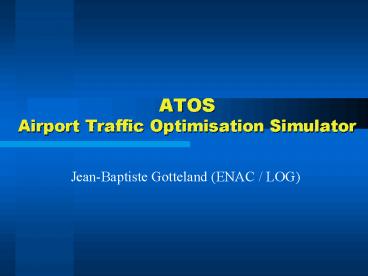ATOS Airport Traffic Optimisation Simulator - PowerPoint PPT Presentation
1 / 23
Title:
ATOS Airport Traffic Optimisation Simulator
Description:
Airport Traffic Optimisation Simulator. Jean-Baptiste Gotteland (ENAC / LOG) ... Apply global optimisation methods to each traffic situation. ATOS main features ... – PowerPoint PPT presentation
Number of Views:405
Avg rating:3.0/5.0
Title: ATOS Airport Traffic Optimisation Simulator
1
ATOSAirport Traffic Optimisation Simulator
- Jean-Baptiste Gotteland (ENAC / LOG)
2
Outlines
ATOS
- Main features
- Context
- Airport and traffic description
- Simulation principle
- Solving ground traffic conflicts
- Problem modelling
- Deterministic approach
- Genetic Algorithms
- Applications
- Measure the delay sensitivity
- Handle CFMU takeoff slots
- Conclusions and further work
3
Background
ATOS main features
- ATT division (DSNA / DTI)
- Airport, Tower and Terminal area
- SALSA (Systèmes dAssistance à la circulation
Locale et au Sol sur les Aéroports) A detailed
airport simulation platform - SAMBA (Systèmes dAnalyse des Mouvements et des
Besoins des Aéroports) - A tool to measure global indicators concerning
airport efficiency - LOG (DTI - ENAC)
- Global Optimisation Laboratory
- OPAS-En-route conflicts resolution using
Genetic Algorithms - ? ATOS Goals
- Airport traffic simulations, with conflicts
detection and resolution - Include real time and operational constraints
- Apply global optimisation methods to each
traffic situation
4
Fast time simulator
ATOS main features
Airport description Gates Runways Taxiways
Simulation Traffic prediction Conflict
detection Conflict resolution
Statistic measures Number of aircraft Taxi
delays Detours Congestion points ()
Aircraft types Engines Wake turbulence
Flightplan Departure / Arrival times Gate and
runway Aircraft ()
5
Shifted windows principle
ATOS main features
Situation considered at time t-?
tTw
t
t?
- Traffic prediction considering speed
uncertainties - Conflict detection and resolution
- Application of the decisions between t and t?
- t ? t?
Situation considered at time t
tTw?
t?
6
Airport and traffic description
ATOS main features
Conflict detection
- Traffic prediction with speed uncertainty
- Tw Time Window
- ? Simulation steps
Taxiways with official one-way restrictions
Push-back procedures
Gate access
7
ATOS traffic solver
Problem formulation
- Assign paths and holding positions to aircraft,
- such that
- no conflict remains in the time window
- the global optimisation criterion is minimal
8
Find a solution for each traffic situation
ATOS traffic solver
- Assign a set of alternative paths to each
aircraft - Define the possibilities that will be studied
- Must be large enough
- But complexify the problem
- Solve the global situation
- With a deterministic (but simplified)
optimisation method - With genetic or hybrid algorithms
- Measure the efficiency of each method
- By applying the resulting manoeuvres
- And simulating the traffic during a complete day
9
Examples of paths at CDG
Sets of alternative paths
12 paths without any restriction
12 paths considering one-way restrictions
10
Solving the situation
The 1-against-N method
- Assignment of priority levels
- Aircraft are sorted
- Simplified problem optimise one aircraft
trajectory - avoiding all previous considered ones.
- Graph exploration
Go forward
next(p) at t1
Cost ?
Position p at time t
Hold position
Cost 1
p at t1
11
Solving the situation
The two G.A. methods
- Simple method (Initial GA)
- A path and a holding position per aircraft (n,
pos, t) - 3N variables
- Mixed method (Hybrid GA)
- A path and a priority level per aircraft (n,
prio) - 2N variables
- Same fitness function
- When unsolved conflicts still remain
- Otherwise
12
Simulations results
Comparing the solvers
13
Impact of the anticipation at Roissy
Delay sensitivity
unexpected results...
14
Impact of the anticipation at Roissy
The reason why...
Conflicts (clusters) size
15
Impact of one-way restrictions
Delay sensitivity
All Partial None
All Partial None
All Partial None
16
Impact of speed uncertainties
Delay sensitivity
17
Summary
Delay sensitivity
- Best anticipation 5 minutes
- Due to speed uncertainties
- Decrease the complexity of the problem
- One-way restrictions
- Make taxiing times more regular (predictable)
- Penalising during low traffic periods
- Speed uncertainty reduction (50 ? 20)
- Can potentially reduce the mean delay of 50
- Increase the traffic predictability
- High ground delay sensitivity
18
Handling CFMU takeoff slots
Applications
- Background
- European regulation of the traffic (CFMU)
- ? Takeoff slots required for aircraft
- crossing overloaded airspace.
- Airport controllers responsibility
- Problems
- Slot delayed takeoff time (can exceed 1 hour)
- ? Solver initial anticipation (5 min) too short
- ? Needs
To anticipate taxi-out times (by simulation) To
refine the criterion
19
Refining the criterion to minimise
Handling CFMU takeoff slots
F Regulated aircraft penalty ? Deviation from
the slot (minutes)
20
Simulations results
Handling CFMU takeoff slots
21
Delay of non regulated aircraft
Handling CFMU takeoff slots
22
Conclusions
- Ground traffic predictability is low
- The system must be flexible
- Ground delay sensitivity is high
- Congestion vicious circle
- Efficiency of priority levels assignment
- Manage correctly speed uncertainties
- Adapted to the operational way of thinking
- Potential interests for ground controllers
- Decision support tool
- Constraints management (CFMU slots)
- Conflicts anticipation (collision avoidance,
runway incursions)
23
Further work
- Simulator enhancement
- Add some new specific procedures
- Refine the criterion in collaboration with
controllers - Test some other optimisation methods
- Other applications
- Impact of the airport configurations
- Impact of the runway crossing strategy
- ...
- Integration in the SALSA experimental platform
- Taxi planning tool
- Delay predictions module































